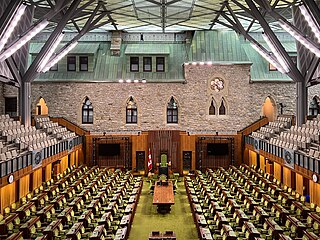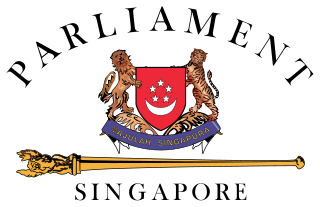
The House of Commons of Canada is the lower house of the Parliament of Canada. Together with the Crown and the Senate of Canada, they comprise the bicameral legislature of Canada.

The Speaker of the House of Commons is the presiding officer of the House of Commons, the lower house and primary chamber of the Parliament of the United Kingdom. The current speaker, Sir Lindsay Hoyle, was elected Speaker on 4 November 2019, following the retirement of John Bercow. Hoyle began his first full parliamentary term in the role on 17 December 2019, having been unanimously re-elected after the 2019 general election.

The speaker of a deliberative assembly, especially a legislative body, is its presiding officer, or the chair. The title was first used in 1377 in England.

Allan Kemakeza was the prime minister of Solomon Islands from 2001 to 2006. He represented Savo/Russel Constituency in the National Parliament of Solomon Islands from 1989 to 2010 and was most recently Minister of Forestry December 2007 to August 2010. He served as Speaker of the National Parliament, from September 2010 to 2014.

In New Zealand, the speaker of the House of Representatives, commonly known as the speaker of the House, is the presiding officer and highest authority of the New Zealand House of Representatives. The individual who holds the position is elected by members of the House from among their number in the first session after each general election. They hold one of the highest-ranking offices in New Zealand. The current Speaker is Gerry Brownlee, who was elected on 5 December 2023.

The National Assembly is the directly elected house of the Parliament of South Africa, located in Cape Town, Western Cape. It consists of four hundred members who are elected every five years using a party-list proportional representation system where half of the members are elected proportionally from nine provincial lists and the remaining half from national lists so as to restore proportionality.

The speaker of the Lok Sabha is the presiding officer and the highest authority of the Lok Sabha, the lower house of the Parliament of India. The speaker is elected generally in the first meeting of the Lok Sabha following general elections. Serving for a term of five years, the speaker is chosen from sitting members of the Lok Sabha. The longest-serving speaker was Balram Jakhar, whose tenure lasted 9 years and 329 days.
Solomon Sunaone Mamaloni was a Solomon Islands politician. He was the first chief minister of the islands, and later served as the prime minister for three spells in the 1980s and 1990s.

The Parliament of Singapore is the unicameral legislature of the Republic of Singapore, which governs the country alongside the president of Singapore. Largely based upon the Westminster system, the Parliament is made up of Members of Parliament (MPs) who are elected, as well as Non-constituency Members of Parliament (NCMPs) and Nominated Members of Parliament (NMPs) who are appointed. Following the 2020 general election, 93 MPs and two NCMPs from three political parties were elected to the 14th Parliament. Throughout the sitting of Parliament, nine NMPs are usually appointed by the president on a biennial basis.

The National Assembly (Bulgarian: Народно събрание, romanized: Narodno Sabranie is the unicameral parliament and legislative body of the Republic of Bulgaria. The first National Assembly was established in 1879 with the Tarnovo Constitution.

The Speaker of the Dewan Rakyat is the highest-ranking presiding officer of the Dewan Rakyat, the lower house of the Parliament of Malaysia. They are responsible for convening sessions of the Dewan Rakyat, organising debates, and examining the admissibility of petitions, bills, and amendments. In the absence of the Speaker, one of their deputies will take their place.

The National Assembly is one of the two components of the Parliament of Guyana. Under Article 51 of the Constitution of Guyana, the Parliament of Guyana consists of the president and the National Assembly. The National Assembly has 65 members elected using the system of proportional representation. Twenty five are elected from the ten geographical constituencies and forty are awarded at the national level on the basis of block votes secured, using the LR-Hare Formula as prescribed by the elections Laws (Amendment) Act 15 of 2000.

Bartholomew (Bart) Ulufa'alu CMG was the prime minister of Solomon Islands from 27 August 1997 to 30 June 2000.

The Speaker of the Parliament of the Democratic Socialist Republic of Sri Lanka is the presiding officer of the chamber. The current Speaker of the Parliament is Mahinda Yapa Abeywardena, in office since 20 August 2020. The Speaker fulfills a number of important functions in relation to the operation of the House, which is based upon the British Westminster parliamentary system.
Steve William Abana is a Solomon Islands politician. He is a former Member of Parliament for Fataleka and was the Leader of Her Majesty's Opposition from August 2010 to March 2011.

Gordon Darcy Lilo is a Solomon Islander politician who served as the prime minister of Solomon Islands from 16 November 2011 to 9 December 2014. He was a member of the National Parliament of the Solomon Islands, representing the Gizo/Kolombangara constituency spanning Gizo and the island of Kolombangara in Western Province. Lilo served as the Minister of Finance of the Solomon Islands from 2006 to 2007 and from 2010 to 2011.
North East Guadalcanal is a parliamentary constituency electing one representative to the National Parliament of Solomon Islands. It is one of eight constituencies in Guadalcanal Province. It had an electorate of 5,584 in 2006.
Namson Tran is a Solomon Islands businessman and politician.

The Speaker of the Parliament of Ghana is the presiding officer of the Parliament of Ghana. The current speaker, Alban Kingsford Sumana Bagbin, was sworn-in as Speaker of the Eight Parliament of Ghana on 7 January 2021.

The 27th South African Parliament is the sixth Parliament of South Africa to convene since the introduction of non-racial government in South Africa in 1994. It was elected in the general election of 8 May 2019 and consists of the National Assembly and the National Council of Provinces. The National Assembly contains 400 members, while the National Council of Provinces contains 90 members. It was formally opened by President Ramaphosa's State of the Nation Address in a joint sitting on 20 June 2019.
















